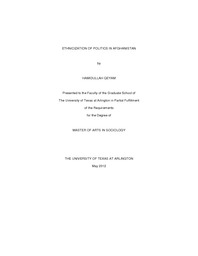
ATTENTION: The works hosted here are being migrated to a new repository that will consolidate resources, improve discoverability, and better show UTA's research impact on the global community. We will update authors as the migration progresses. Please see MavMatrix for more information.
Show simple item record
| dc.contributor.author | Qeyam, Hamidullah | en_US |
| dc.date.accessioned | 2012-07-25T19:22:49Z | |
| dc.date.available | 2012-07-25T19:22:49Z | |
| dc.date.issued | 2012-07-25 | |
| dc.date.submitted | January 2012 | en_US |
| dc.identifier.other | DISS-11704 | en_US |
| dc.identifier.uri | http://hdl.handle.net/10106/11154 | |
| dc.description.abstract | This thesis project examines the relationship between ethnic identity and politics and to explore how ethnicity has influenced the post-Taliban state building, the electoral system, and ethnic manipulations in presidential and parliamentary elections in Afghanistan. First, in order to better understanding the problem of ethnic politics in Afghanistan, it will provide detailed information on the background of Afghanistan including the historical background of the country as an independent state, ethnic groups, residential segregation, group size, construction and the crisis of "Afghan" national identity, and debates over the new Afghan National Identity Card. Then, it discusses the problem of ethnic politics in historical context of Afghanistan, particularly in the post-2001 Afghanistan. In order to find a permanent solution for the problem of ethnic politics, this thesis discusses some of the most important ways in which democracies have responded to the demands of different ethnic groups in a multiethnic country like Afghanistan.Ethicizing political issues is prevalent throughout the world, but it is highly pervasive in the case of Afghanistan. Historically, one single ethnic group, Pashtuns, ruled the country and excluded other ethnic groups from political scene. Many sensitive issue and the roots of ethnicication of politics, such as Afghan National Identity, clarifying the exact number of each ethnic group via a census, electoral system that fits in the context of the country, equally distribution of power among the distinct communities, and particularly re-establishment of political authority, are not solved in the post-Taliban era of Afghanistan. This thesis argues that the formation of a broad-based federal structure or a power-sharing parliamentary system that reflects the ethnic composition of Afghan society as a whole would be one of best options to solve the crisis of ethnic politics in Afghanistan. | en_US |
| dc.description.sponsorship | Kunovich, Robert | en_US |
| dc.language.iso | en | en_US |
| dc.publisher | Sociology | en_US |
| dc.title | Ethnicization Of Politics In Afghanistan | en_US |
| dc.type | M.A. | en_US |
| dc.contributor.committeeChair | Kunovich, Robert | en_US |
| dc.degree.department | Sociology | en_US |
| dc.degree.discipline | Sociology | en_US |
| dc.degree.grantor | University of Texas at Arlington | en_US |
| dc.degree.level | masters | en_US |
| dc.degree.name | M.A. | en_US |
Files in this item
- Name:
- Qeyam_uta_2502M_11704.pdf
- Size:
- 327.2Kb
- Format:
- PDF
This item appears in the following Collection(s)
Show simple item record


